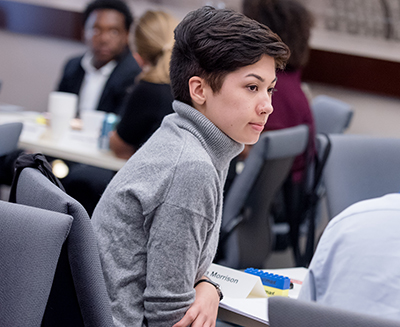
Meet Kara Watkins-Chow
Among the student leaders from across the country who attended USC Shoah Foundation’s inaugural Intercollegiate Diversity Congress (IDC) Summit in October were two representatives from USC itself. One was Kara Watkins-Chow, who came away from the summit with new ideas and insight to take back to her role as president of the Queer & Ally Student Association.
At the IDC Summit on Oct. 13-14, the 20 participants – student leaders from universities across the country – learned about the Visual History Archive, IWitness, and strategies for using testimony to promote tolerance and inclusion on their campuses. They also learned how to construct their own activities in IWitness and had dinner with Yannick Tona, a child survivor of the Rwandan Tutsi Genocide who is now a motivational speaker in the United States.
USC Shoah Foundation postdoctoral teaching fellow Sara Brown, who helped organize the IDC Summit, invited Watkins-Chow to attend so she could gain an introduction to USC Shoah Foundation and learn about its testimony-based resources that could be used to form connections between students.
“It was an opportunity to try to think more critically about how we’re starting conversations on campus and how the voices that we bring into this conversation can impact the outcome,” Watkins-Chow said.
While watching testimony clips at the IDC Summit, Watkins-Chow was inspired by the idea of collecting people’s stories. She’s hoping to conduct video interviews with students who live in USC’s gender-neutral student housing in order to raise awareness and encourage other students to explore these inclusive housing options.
“It’s representing voices from different folks from the community in a more personal, dynamic way which is something we haven’t done before,” she said.
Students who push for change don’t always feel like campus administrators are on their side, Watkins-Chow said. But she said it was refreshing to see USC Shoah Foundation’s willingness to explore issues surrounding diversity and inclusion on campus and its enthusiasm for providing resources and guidance to support student-driven efforts.
At a large university like USC, with a student body that is extremely driven and passionate, it can be easy for students to become so focused on their own interests that they lose perspective of the overall campus climate. That’s why Watkins-Chow believes it’s important for students to address topics surrounding diversity and inclusion at forums like the IDC Summit.
“It’s so important especially on a campus as large as ‘SC to think critically about how every person here has their own story and their own life but is part of something better,” she said. “[We need to] make sure everyone is connected and included in an equitable way and that the same things are accessible to everyone.”